HE SHE THEY Mixmag V1
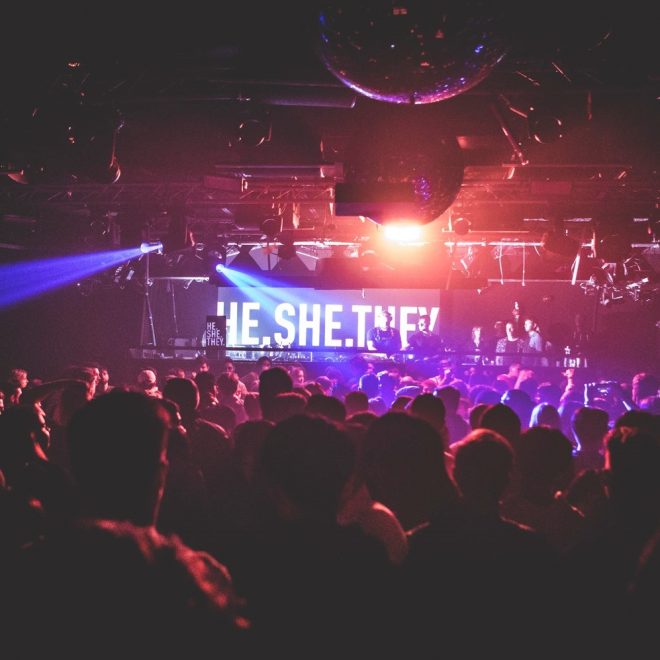
Equality, diversity, and inclusion—that is what HE.SHE.THEY. stands for. It’s not just a daydream for Amsterdam this coming Pride Week. But what about the rest of the year? HE.SHE.THEY., rooted in England, is an international house and techno event, record label, clothing brand, and, as the name suggests, a place for everyone. After the success of stage hosting at Dockyard Festival during Amsterdam Dance Event last year, founders Sophia Kearney and Steven Braines are bringing their unique formula to Amsterdam during Dockyard presents HE.SHE.THEY. on August 3rd at the Thuishaven venue during Amsterdam Pride. They are also hosting two stages for Dockyard this ADE, one at Dockyard Festival x Mystic Garden Festival ADE, and one at Dockyard Warehouse Festival. There is certainly a need for freedom of expression, acceptance, and diversity. While clubs like RoXY and Trouw used to naturally embody authenticity and diversity, this has faded more into the background in the dance world in recent years. Steven and Sophia want to make everyone feel welcome with their unique concept, HE.SHE.THEY.. They could evoke nostalgic memories for some older ravers.
“‘Can you remember when dance music culture was all about breaking down barriers, rather than building them? When it didn’t matter who you were, as long as you were friendly and could be yourself? Well, we feel it’s high time to return to those inclusive, ideological roots. From DJs to performers, we’re about giving those who push boundaries a platform, and we invite our partygoers to push their own boundaries,’” it says on their website.
Through their years of experience in the dance world, managing the biggest DJs and touring for months on end, Sophia and Steven have become experts in the house and techno industry. Steven explains, “With the DJs, we have straight white guys like Ben Klock who play for us, but we also have a mix of people. When you look up from the dancefloor at the DJ booth, you might see someone who is like you on one level—because they’re white, or maybe because they’re a woman, black, brown, or queer. And then you can also look at the dancers and see a six-pack, but also someone with a much curvier body. There’s someone who might have a disability. We have all these types of people because we want someone in the crowd to look up and feel like this isn’t just a place where they’re allowed. This is a place where people who look like them are present. Therefore, you are included; you are welcome.”
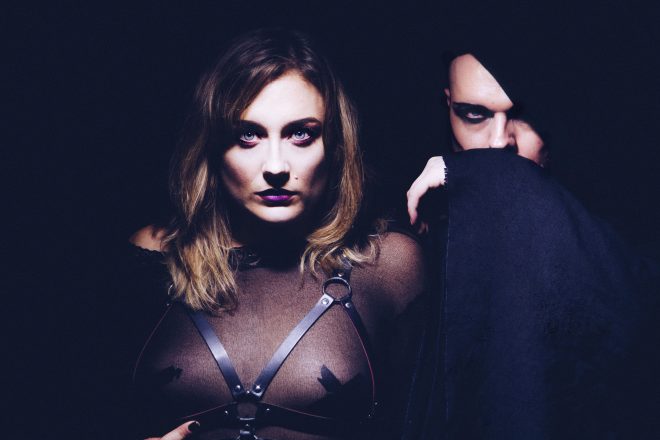
THE START
For some people, spending three hours wandering around a department store sounds like a typical Sunday afternoon. For Sophia and Steven, this was how they became business partners. Tucked away in a showroom corner of a 1950s interior in the British department store John Lewis in 2011, Steven was looking for a freelancer to help him in the music industry. Steven reminisces, “The person who is my business partner, I want to be really dynamic, so why don’t I pretend I need to buy sheets?” Sophia jokingly interrupts, “Bullshit, you just wanted to kill two birds with one stone.” Steven continues, “In music management, it doesn’t matter where you are. If you’re on a plane or your grandma has just passed away, some things can happen, and you have to be able to wing it and make it happen. So many people are asking, ‘When is the meeting going to start?’ Sophia was the one who said, ‘Okay, let’s go and sit down on the fake furniture and create the meeting.’ I was like, ‘This is my business partner.’ This is someone who can handle the situation. We’re in a department store, and she manages to turn it into a work situation in a pragmatic way.”
Sophia had the same feeling, “I remember us saying goodbye, hugging each other, and him walking off towards the tube. Then we looked at each other and thought, ‘Yeah, let’s try and do something together.’ I just had this feeling I was supposed to follow this. But to be honest, it was an unstable situation. This guy looked like he hadn't slept for two years.” Steven replies, “I probably hadn’t.” Sophia continues, “It was the same feeling I had when I went to Glastonbury at 17 and realized I wanted to work in the music industry. I knew I had to just do it because it was leading me there, but it felt unstable.”
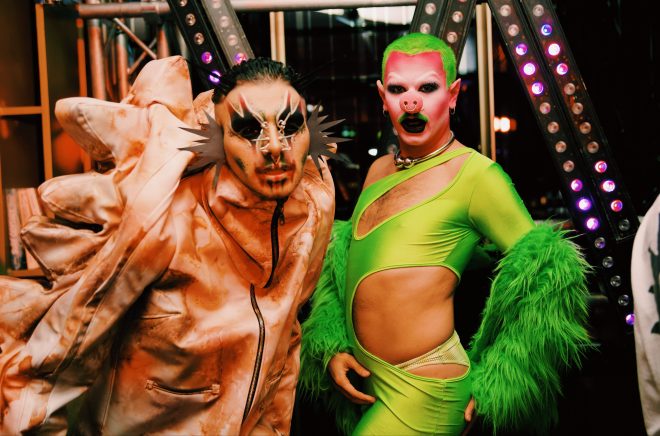
Sophia and Steven both had years of experience in music management for artists such as Miike Snow, Swedish House Mafia, Maya Jane Coles, Tricky, Tale of Us, Magda, Catz 'n Dogz, and more. After the department store meeting, they became a management duo, although Steven preferred to work from home. Sophia says, “We used to get into bed together, order chicken, watch music videos on loop, and talk about everything we were going through, solving problems. One of the things we always came back to after touring with all these artists was: we stand in a million artist booths and look over millions of festival crowds. When you’re traveling from country to country and on the road for 5+ years, you start to get a real sense of what works in different countries, the social psychology of the crowd—things that we both find really fascinating. We couldn’t help but analyze all the data we were absorbing.”
It came to their attention that not only on stage and in crowds, but also backstage in green rooms, there was not much diversity. Steven notes, “For example, if there were women, they were almost always in PR and marketing, often not in decision-making roles in the music industry.” They also noticed the need for diversity in the industry within their own friendship group. Sophia explains, “We had a very diverse friendship group, largely consisting of people of color, queer individuals, and women. Our friendship was incredible, but quite often we would all meet up for an afterparty in London, having been to six different club nights. Afterward, we would all gather together. During one of Steven’s and my chicken-eating meetings, we wondered, ‘Where’s the party we want to go to where all of our friends would be and wouldn’t have to come from all these different spaces where they felt most comfortable?’” Steven adds, “Sometimes it’s nice to be in a space that looks like a United Colors of Benetton ad from the '90s, where everyone is represented in a positive way. If you're, for instance, a trans woman of color, you’re not the exotic one. There’s no reason why a black trans woman can’t have a best friend who’s a straight white guy. All people should feel safe and welcome in the bigger capacity spaces.”
All of this brought Sophia and Steven to Amsterdam in 2017. During Amsterdam Dance Event, the duo had four meetings in one day. Without a pitch, deck, or official preparation—just with an idea, a feeling, and an ideal vision in their minds. They got their first yes after the first meeting. Sophia recalls, “I remember us standing underneath an umbrella together, looking at Google Maps, trying to find the next meeting in the pouring rain, and we realized that the first party was just four months away and we had no lineup, no branding, no logos, fonts—none of the creative elements or dancers.” Every other meeting resulted in a yes, including an offer from Amnesia Ibiza for a 16-week residency. HE.SHE.THEY. was officially born.
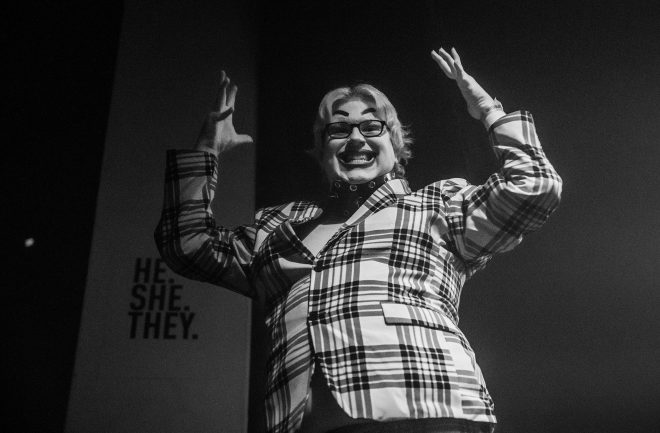
THE VISION
HE.SHE.THEY. includes everyone at their events around the world. From Bristol to New York City, Berlin, Dallas, Rome, Helsinki, Chile, South Africa, Australia—the list goes on and on. But how do they ensure that everyone feels included? Surely, most clubs would dream of this being an organic process. Steven explains, “A lot of promoters say, ‘The main people who come to our parties are men.’ Well, yes, because if you organize a night with three straight guys DJing and girls who are size 0 with breast implants dancing, guess what? Guys will attend. Who would have thought that if you design a night like this, it won’t attract a diverse crowd? It’s no surprise that gay black men aren’t coming to the event. When you showcase different types of people, you’ll see that the dance floor really changes.”
Sophia, “Our only criterion when recruiting new dancers is simple: whatever your skill is, we want to embrace it. Maybe you’re a contortionist, maybe you’re 4 feet tall, or maybe you’re brilliant at drag. Whatever your gift, let’s celebrate it and share it with people. Let’s also mix different types of people with the Ben Klocks and Eats Everythings of the world. This approach helps diverse audiences come to see these established cis straight white male DJs, while also introducing them to performers from completely different demographics.”
By introducing these familiar fanbases to a more diverse lineup, HE.SHE.THEY. can win those fans over and build a more diverse, talented pool of headliners for the future.
Sophia explains, “All of those fans of these artists, who might often be other cis straight white men, will come and watch. They will also see that the artists they idolize and look up to are totally cool with who they are sharing the stage with. They’re vibing with the dancers. They’re smiling, they’re laughing—it’s fun. It’s not awkward or weird; there’s no segregation. For an audience to stand there for eight hours and watch the journey of that party, seeing all different people come and take over the podium and the decks, it is a fucking party. That reflection feeds out onto the dance floor and hopefully influences how people interact with those around them who are different. Fingers crossed, how you can ever measure this, I don't know. But its existence is just the hope that it’s happening. Maybe they take a little bit of that spirit and essence and carry it out onto the streets with them when they leave. And they might be less likely to laugh along with a transphobic slur they hear from politicians or in the news or whatever. Or at least, they question it and think: 'Hey, I was on the dance floor the other weekend with all these different people, and we had a great time. Why are we being told in other ways that we’re all enemies and should be afraid of each other? Why are women being told they should be afraid of a trans person sharing their bathroom?' It's not actually real. It’s not what really happens. If we can create beautiful environments under a shared joy of music, which all these people have in common, then maybe that changes things a little bit, just a little bit.”
Steven adds, “There’s no right way to be queer, there’s no right way to be a woman, and there’s no right way to be non-binary. Many people come to HE.SHE.THEY., and it’s noticeable that some women who are lesbians have longer hair and present more femme. We’ve all had bad experiences within queer spaces. Sometimes people come up to me and say, ‘Oh, it’s not that queer here.’ And I respond, ‘Who do you think is not queer?’ I point out, ‘No, she’s a lesbian, she’s a lesbian, she’s straight, and she’s a lesbian.’ We’re trying to break down some of those barriers as well. We don’t think we’ve solved all of mankind’s issues.”
Besides uniting all kinds of people at parties through house and techno music, HE.SHE.THEY. also uses various platforms to spread their message and music. They recently launched a weekly syndicated radio show, which Sophia presents in 10 different countries. He.She.They also has its own show on BBC Radio 1. Additionally, they will be launching their clothing brand in retail stores next year. Steven and Sophia also manage the HE.SHE.THEY. record label that’s on its 70th release. Steven explains, “We’ve been able to showcase different aspects of what we’re into. For instance, Cakes da Killa has released music under our label, adding a hip-hop flavor. Then there’s Rebekah, who has provided remixes that are heavier and harder, and Maya Jane Coles, whose work is softer and more delicate. It’s been great to see the opportunities that happen when someone has been given the chance to shine with the release.”
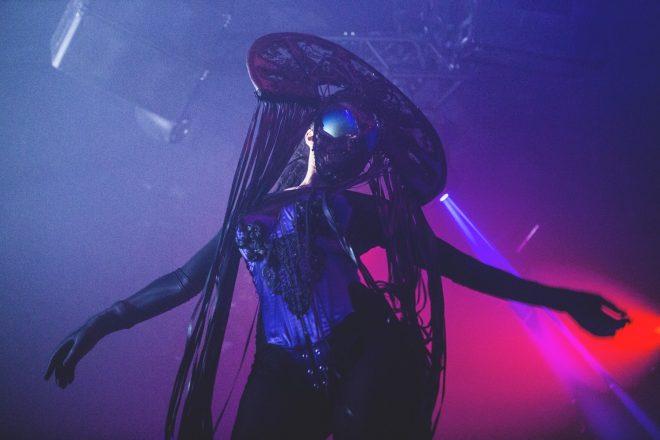
THE COLLABORATION
Steven and Sophia are dedicating all their time to HE.SHE.THEY., achieving remarkable success. The stage hosting at Dockyard Festival last year was an excellent beginning that has since developed into a fantastic collaboration.
Steven explains, “If you don’t have big parties like Dockyard Festival and the support of people who share a dream and ideal, like the founders of Dockyard, Coen and Tania, you might miss out. We discuss many details, such as: ‘Have you thought about security? What about the dancers and how they’ll get home? Have you considered this and that?’ If someone is committed, they might simply say, ‘I want a diverse night.’ It can be quite exhausting to work with us in that sense. In the past, there were organizations that wanted to work with us but didn’t genuinely want to change. They didn’t really want a diverse night; they just wanted to be able to claim it.
Originally, we started working with Dockyard because they wanted to make their festivals more diverse, and we wanted to help them achieve that. It worked really well because of the mindset of the people at Dockyard. This commitment to diversity and inclusion comes all the way from the top of the organization down. They believe in equality, diversity, and inclusion. The fact that they have a female leader and more women in key positions contributes to this environment. It’s okay not to know everything, and we learn from each other. It’s a collaboration in its truest sense.”
Steve says, “This ADE, we’ve got big acts like Dax J and SPFDJ, and then we also have Chippy Nonstop and Wax Wings. It’s great to have such a real mix on the main stage, with a lot of women—actually more women than men—queer people, and people of different skin colors. You know what the best part is? If we’ve done our job right, when you look at the lineup, you wouldn’t even think about the diversity. You’d just think, ‘Wow, this lineup is amazing.’ Our goal is to make it an incredible party, not just a ‘diverse party.’”
HE.SHE.THEY. is not only involved in booking talent for the party; they are committed to ensuring equality, diversity, and inclusion at every level of the event.
Sophia explains, "We designed a Google Form with about 25 questions covering everything we need to know. We prepare a security briefing and create gender-neutral toilet signs and downloadable files. We ask the head of security to review the security document and ensure that it’s communicated using inclusive language, like saying 'hey everyone' instead of 'hey guys.' Often, Steven and I will present the briefing at a new venue with the head of security by our side, making sure everyone pays attention. Standing in front of 60 security staff in full attire to explain these details can be challenging, but everyone has always been incredibly supportive and open."
Sophia shares, "Last year, Dockyard Festival gave us one of the nicest compliments. After the show, they told us how much they had learned from the points on the form and expressed their intention to incorporate those ideas into other festivals. It’s rewarding to know that other clubs have adopted some of these practices for their own events. It’s not about enforcing a 'HE.SHE.THEY. policy' or gatekeeping; it’s about making positive changes across the industry."
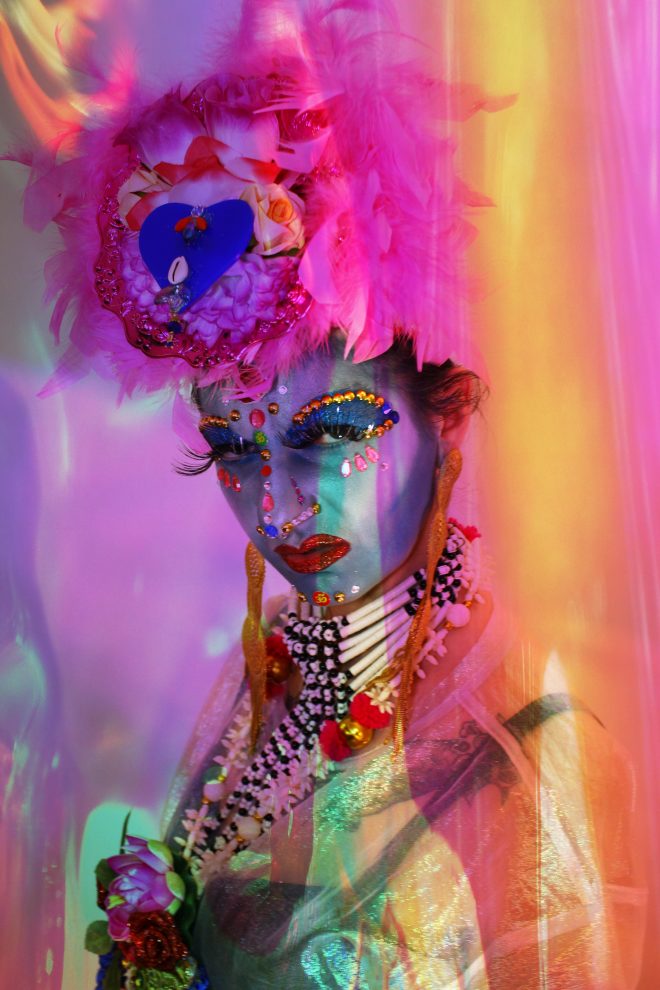
THE PRIDE
With Amsterdam Pride Week just around the corner, from Saturday, July 27 to Sunday, August 4, the city will be more vibrant than ever. In a liberal country like the Netherlands, where gay marriage was first ever legalized in 2001, is Pride Week still necessary?
“In a world where rights we think are unshakeable can go backward, Pride Week is more necessary than ever. Take abortion rights in America, for example. In the same way as gay people, as well as we see in the trans community, we need to unite. The fact that we have gay marriage now doesn’t mean it can’t be reversed. Similarly, just because being queer isn’t illegal at the moment doesn’t mean it can’t be again. We’re only ever one election away from losing everything.I think it’s also really important to demonstrate that you can be gay and happy, or trans and happy. Pride Week also shows you that you’re not alone. The Pride parade, in many ways, is incredibly significant," Steven explains.
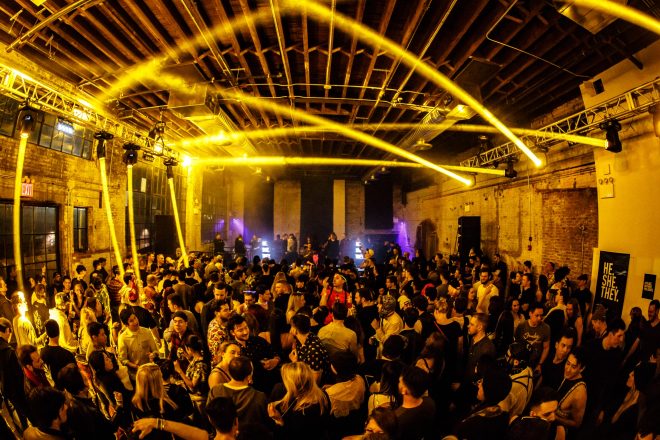
THE FUTURE
With HE.SHE.THEY. working to normalize equality, diversity, and inclusion around the world, will they ever be 'done'? Will there ever be a world where the message is as widespread as the nostalgic dance music culture, known for breaking down barriers and just being friendly? Sophia believes the job is never truly finished.
"I don’t know if the job is ever truly done,” Sophia says. “It will continually reinvent itself and evolve. There will always be ways to improve. How can we improve on the welfare side of things? How can we ensure more representation on security teams? There will always be new aspects to address. There will constantly be new waves of ravers joining the scene.
One thing I’ve particularly noticed is the importance of teaching people about the origins of the scene and who started it. Dance music was pioneered by queer, Black, and Latino communities in North America. Ravers from the '90s likely understood these origins better because it was contemporary and discussed in magazines. Today, if you’re a 19-year-old raver whose first dance tracks were from Skrillex, Martin Garrix, David Guetta, or Swedish House Mafia, do you truly know about the 15 years that before that? We have a responsibility to educate the younger generation about the communities they should respect for the music they love. This responsibility extends to everyone in the industry, not just those on the dance floor. It’s crucial for everyone to remember why the scene was created—it was born out of protest, a response to societal rejection, and the stigma of the AIDS crisis. Continuous education is essential if we’re all going to thrive in this industry.”
Education is key for Sophia and Steven, but what about the welfare team? Every event typically has security and first aid teams, but HE.SHE.THEY. aims to go beyond these standard roles. Sophia: “Welfare is a huge focus for us at the moment, and we’re doing our best to integrate a welfare team into our upcoming Ibiza season. At HE.SHE.THEY., we envision a welfare team that operates separately from security. This team, dressed like ravers, and wearing a high vis saying ‘welfare’. Perhaps there’s a welfare point somewhere or they might even be down on the dance floor. They might approach ravers who are on their own, offering to sit with them for 20 minutes to enrich their evening. Or if someone reports feeling uncomfortable or is being stared at, they can turn to the welfare team. The team can listen, help them decide on a course of action, dance with them, or escalate the issue to security if needed. Alternatively, attendees might just appreciate knowing that a sober, attentive person is watching over them. This layer of support and friendliness doesn’t need to be overly formal; it could make a significant difference to someone’s night. We believe that by encouraging more people to report their concerns, we can gather valuable insights on how to better support everyone. We see the welfare team as the next evolution in creating an additional layer of support.”
OUTRO
HE.SHE.THEY.’s impact goes beyond the music. Their innovative approach reflects their dedication to creating safe, welcoming spaces for everyone, embracing all identities—him, her, and they. As we embrace Pride Week, remember that the journey towards equality and inclusion is ongoing. Events like Dockyard Festival remind us of the importance of standing together, celebrating our differences, and pushing for continuous progress. Whether you're an old-school raver or new to the scene, this is your chance to join a celebration that honors the true spirit of diversity, inclusion and great music at Dockyard presents HE.SHE.THEY., August 3rd at Thuishaven Amsterdam. Also catch HE.SHE.THEY. during ADE at Dockyard Festival and Dockyard Warehouse Festival on the 19th of October.
Steven concludes, “We can’t solve the world's problems, but we can give options that, if you’re like-minded and you just like nice people, and you just want to listen to good music, and you don’t want to live in a world where it’s just only you during this party, then here’s an option for you to come to.”


